Natural Rubber PSA vs Hot-Melt: Why Natural Rubber Still Leads the Pack
- PT. Okamoto Indonesia
- Apr 7
- 2 min read

When it comes to adhesive tapes, not all pressure-sensitive adhesives (PSAs) are created equal.
Two of the most widely used adhesive systems in the industry today are Natural Rubber and Hot-Melt. While both have their place, natural rubber PSA tapes continue to lead when it comes to durability, versatility, and performance—especially in professional and industrial applications.
If you’re choosing between the two, here’s why natural rubber should be at the top of your list.
🌱 What Makes Natural Rubber PSA Different?
Natural rubber PSAs are made using latex derived from rubber trees—combined with tackifiers, antioxidants, and stabilizers. This formulation has been trusted for decades for one simple reason: it works exceptionally well, almost everywhere.
Here’s what sets it apart:
Excellent Bonding to Rough SurfacesWhether you’re working with brick, carpet, wood, or even dusty concrete, natural rubber grips tight. Hot-melt? Not so much—it typically struggles on anything that isn’t perfectly smooth and clean.
Resilience in Harsh ConditionsHeat, cold, humidity—natural rubber handles it all. Hot-melt adhesives can soften in high temperatures or become brittle over time.
Eco-Friendly CredentialsUnlike petroleum-based synthetics, natural rubber is a renewable, biodegradable resource. It’s the greener choice for companies that care about sustainability.
Low Odor and Clean HandlingNatural rubber PSAs are easier to work with in enclosed environments—no overpowering chemical smells.
🔥 So Why Do People Use Hot-Melt?
There’s a reason hot-melt PSAs are common, especially in packaging: they’re cheap and fast to make.
They offer:
Instant tack on smooth, clean surfaces
High-speed coating and lamination
Cost efficiency for short-term or disposable applications
But in return, you lose:
Surface versatility
Long-term hold under stress
Environmental sustainability
If performance matters—especially in tough or unpredictable conditions—hot-melt simply doesn’t match up.
🆚 Natural Rubber vs Hot-Melt: Quick Comparison
Category | Natural Rubber PSA | Hot-Melt PSA |
Surface Compatibility | Excellent, even on dirty/rough | Limited to smooth/clean |
Temperature Resistance | Very good | Moderate |
Initial Tack | Strong, progressive | Very strong (instant) |
Long-Term Hold | Superior | Can degrade over time |
Eco-Friendliness | Renewable and biodegradable | Synthetic, petroleum-based |
Cost Efficiency | Higher upfront | Lower cost, faster production |
💡 The Takeaway: Quality Over Convenience
At first glance, hot-melt may seem like the obvious choice—fast, cheap, effective (in the right conditions). But if you're looking for a tape that holds up in the real world—not just the lab—natural rubber PSA wins hands down.
It’s the adhesive system of choice for:
Industrial-grade duct and cloth tapes
Tunnel and gaffer tapes for events, film, and construction
Applications where performance can’t be compromised
Customers who value eco-conscious solutions
In short: if you want a tape you can count on, natural rubber is the way to go.
💬 Want to Learn More?
At PT. Okamoto Indonesia, we specialize in manufacturing high-performance PSA tapes using time-tested natural rubber adhesive systems. Whether you're tackling complex industrial challenges or looking for a premium tape for niche applications, we’re here to help.
📩 Contact us today to request a sample or speak to our team.


Comments